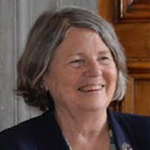Born in Astoria, Oregon (1943), Ann Katherine Isaacs studied at the University of California, Berkeley, and the State University of Milan where she received her degree in Modern Letters, summa cum laude. Research and teaching fellow at the Superior Normal School of Pisa from 1971 to 1975, from 1975 to 2013 she has been professor first of Renaissance, then of Early Modern History at the University of Pisa.
Active in various key projects on the modernisation of higher education, she participated in the ECTS Pilot Project from 1989; she coordinated the European History Networks from 1999 to 2012, including designing and coordinating the Sixth-Framework Network of Excellence, CLIOHRES.net, in which 180 researchers from 31 countries addressed issues of citizenship, identity and inclusion/exclusion (www.cliohres.net). As coordinator of the European History Networks, she edited and published the research results and the teaching materials created in that context, in total 61 volumes.
Isaacs has been deeply involved the Tuning Process around the world (Europe, Latin America, Canada, USA, Russia, and Central Asia); she is ECTS/DS counsellor and Bologna expert; she received the Erasmus Gold Award for Innovation and Creativity in 2008, and a Doctorate honoris causa from the University of Latvia, Riga, for her contributions to the European Higher Education Area and the European Research Area.
From 2013 to 2016 she was Rector’s Delegate for European Programmes (Research, Learning and Teaching) at the University of Pisa; she now coordinates the University of Pisa’s Erasmus+ projects including KA107 mobility with non-European countries, and assists in the coordination of a an Erasmus+ Capacity Building project for Latin America (DHIP: Development of Higher Education Institutions’ Internationalization Policies).
At present she participates in Tuning Southeast Asia and Tuning China. She designed and coordinated the large-scale Tempus project to build a Central Asian Higher Education Area (www.tucahea.org), as well as a project on enhancing Public Health education in Uzbekistan (www.uzhelth.org). She is Erasmus+ Ambassador for Italy; and expert for the European Commission on the implementation of the Erasmus Charter for Higher Education (ECHE). For the past two years, she has represented the Italian Ministry of Education, Universities and Research in the European Commission’s ET2020 working group on Modernization of Higher Education.
From 1 July 2018, and until July 2020, she is Vice-Chair of the Bologna Follow Up Group of the European Higher Education Area, currently comprising 48 countries, numerous consultative members and partners.
In this context she has taken the responsibility for developing Global Policy Dialogue and organizing the Global Policy Forum which will be held in Rome in June 2020, in conjunction with the Ministerial Conference of the European Higher Education Area.

